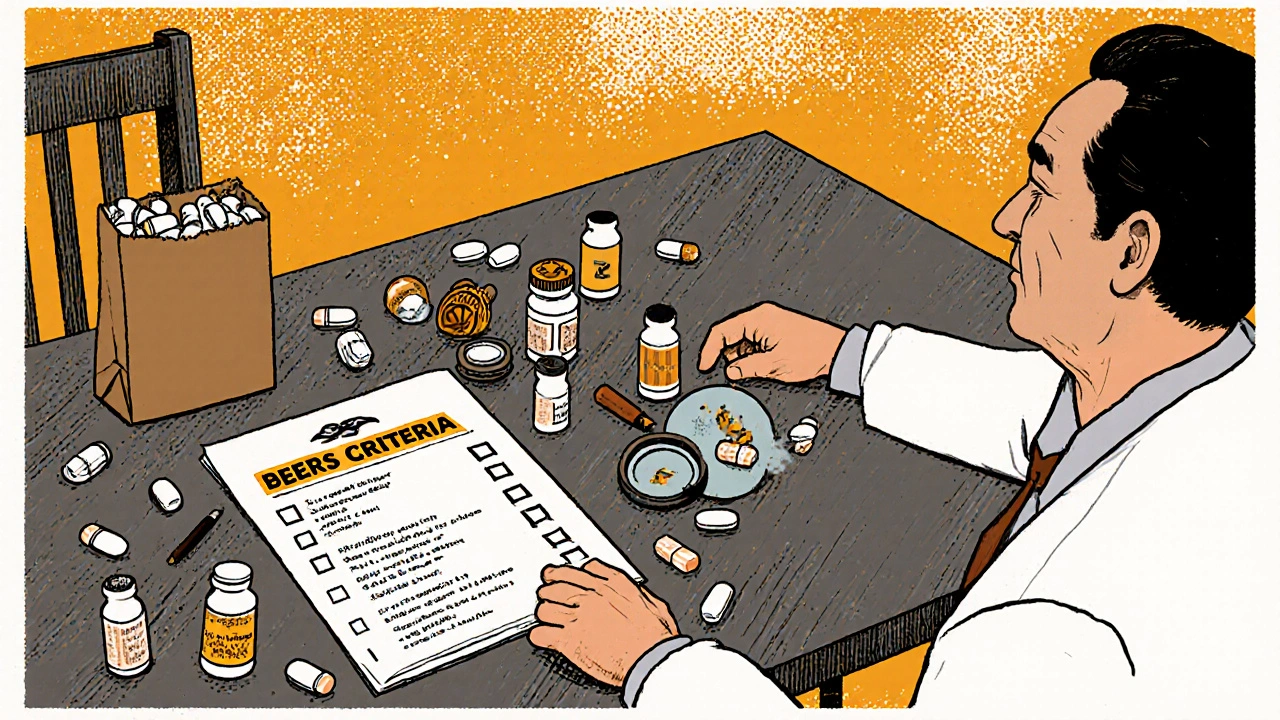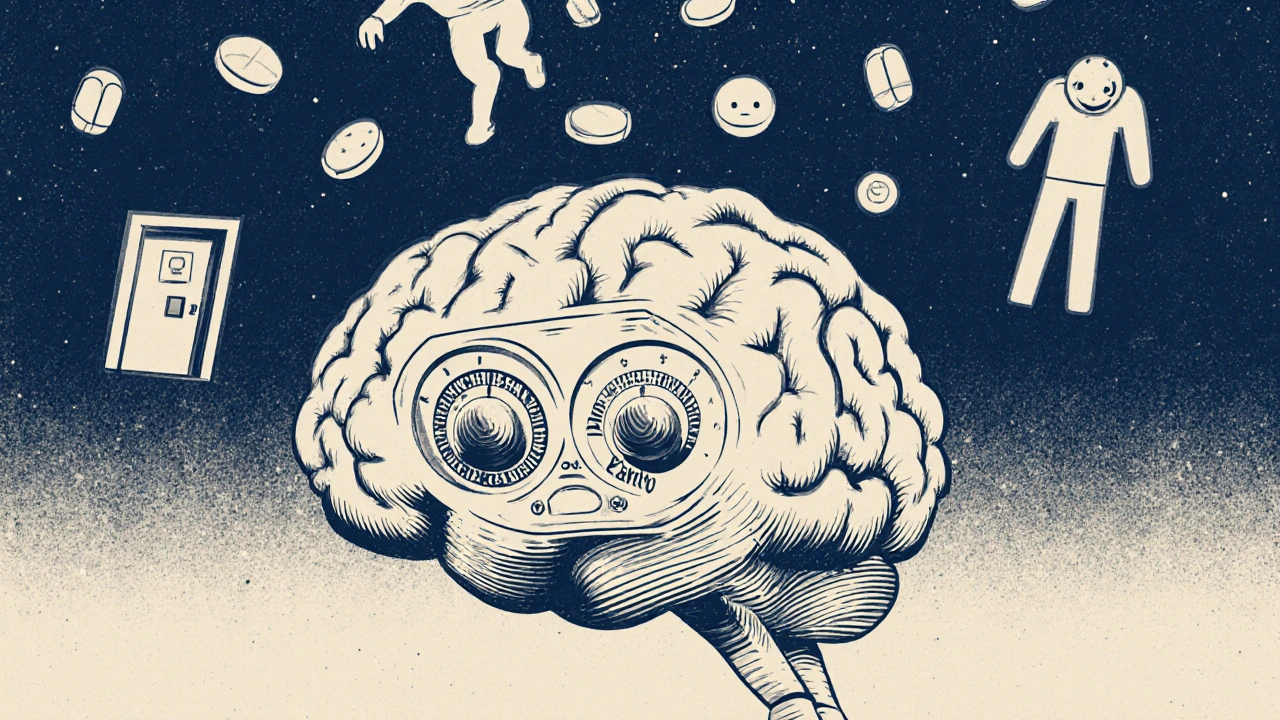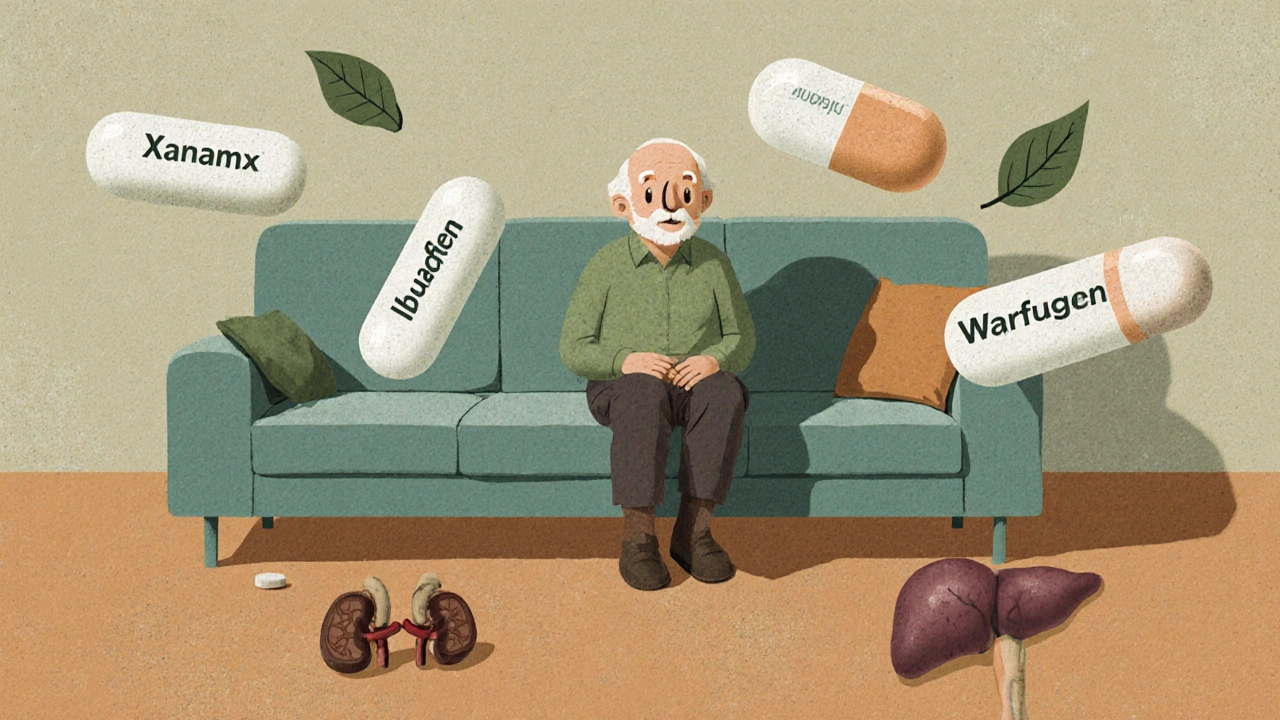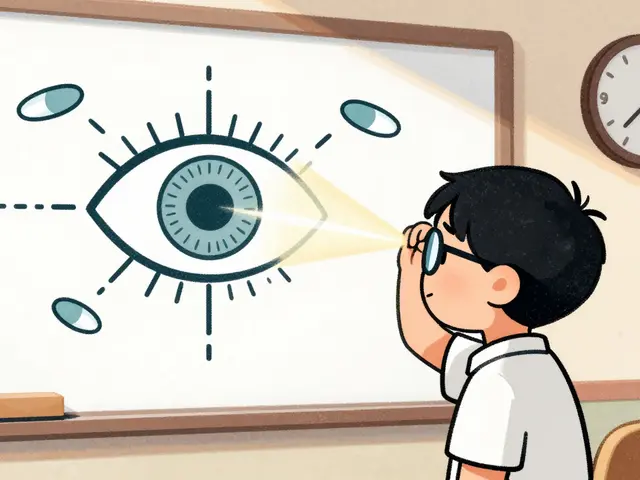Beers Criteria Medication Risk Checker
Check medication safety for older adults
Enter a medication name to see if it's potentially inappropriate for older adults according to the Beers Criteria guidelines.
Why older adults react differently to medications
As people age, their bodies change in ways that make medications behave differently - sometimes dangerously so. A 65-year-old taking the same dose of a drug as a 35-year-old isn’t just getting the same treatment. They’re getting a stronger, riskier one. This isn’t speculation. It’s science. By age 70, kidney function has dropped by nearly half. Liver blood flow has slowed. Body fat has increased. Protein levels in the blood have fallen. All of this changes how drugs are absorbed, moved around, broken down, and cleared from the body. The result? Older adults are more than twice as likely to suffer serious side effects from medications than younger people.
How the body processes drugs changes with age
Think of your body as a factory that processes medication. Aging doesn’t just slow the factory - it rewrites the entire production line. In younger people, water makes up about 60% of body weight. By age 80, that drops to 45%. Fat, on the other hand, climbs from 25% to nearly 50%. This shift changes how drugs dissolve and spread. Water-soluble drugs like digoxin become more concentrated. Fat-soluble drugs like diazepam linger longer, building up over time. The liver, which breaks down many medications, gets less blood flow. That means drugs like propranolol and verapamil stay in the system longer, increasing the chance of overdose. The kidneys, which flush out drugs, lose up to 50% of their filtering power. That’s why drugs cleared by the kidneys - like antibiotics and heart medications - often need lower doses in older adults.
What happens when drugs hit the brain
It’s not just about how the body handles drugs - it’s about how the brain responds. Older brains are more sensitive. A standard dose of a benzodiazepine like lorazepam can cause severe drowsiness, confusion, or memory loss in someone over 70, even if their blood levels match those of a young adult. Studies show diazepam causes 50% more sedation and cognitive impairment in older patients at the same concentration. Anticholinergic drugs - found in many sleep aids, allergy pills, and even some antidepressants - are especially dangerous. They block a key brain chemical, and in older adults, that can trigger delirium. One study found people over 75 were 4.2 times more likely to go into delirium after taking diphenhydramine (Benadryl) than younger adults. That’s not just drowsiness. That’s a medical emergency.

Common medications that become risky with age
The American Geriatrics Society updates the Beers Criteria every two years to list drugs that are too risky for older adults. The 2023 version includes 56 medications to avoid or use with extreme caution. Some of the most dangerous include:
- Benzodiazepines (like Xanax, Valium, zolpidem): 2-3 times higher risk of falls and hip fractures.
- Anticholinergics (like diphenhydramine, oxybutynin, amitriptyline): Cause confusion, urinary retention, constipation - and can mimic dementia.
- NSAIDs (like ibuprofen, naproxen): Increase risk of stomach bleeding and kidney failure.
- Warfarin: Requires 20-30% lower doses. INR levels become unstable in 35% of older patients.
- Propranolol and other beta-blockers: Heart response weakens. You need 50% more drug to get the same effect - but the side effects still hit harder.
- Antidepressants like amitriptyline: Cause urinary retention in older men with prostate issues - sometimes requiring catheterization.
Polypharmacy: When more pills mean more danger
Almost half of adults over 65 take five or more prescription drugs every month. That’s called polypharmacy. And it’s not just about quantity - it’s about interactions. One drug might slow the metabolism of another. Another might worsen kidney damage. A 2022 study found that older adults taking four or more medications had a 70% higher chance of a serious side effect. One man on Reddit, age 78, started amitriptyline for nerve pain and developed urinary retention so severe he needed a catheter within three days. His doctor hadn’t adjusted the dose for his age or considered his prostate. That’s not rare. It’s predictable.
Why doctors miss the signs
Most clinical trials exclude people over 75. That means the dosing instructions on most drug labels are based on data from people under 65. A 2021 study found that 90% of drug trials don’t include older adults with multiple chronic conditions - the very people who need the guidance most. So doctors prescribe based on outdated standards. A 2022 JAMA study showed that 28% of people over 80 developed dangerous drops in blood pressure from standard hypertension meds - compared to just 9% in people aged 50-65. The same dose that works for a 50-year-old can send an 80-year-old to the ER.

What can be done: Deprescribing and safer prescribing
It’s not enough to just add more drugs. Sometimes, the safest move is to take some away. That’s called deprescribing. Experts like Dr. Michael Steinman at UCSF say the goal isn’t just to avoid bad drugs - it’s to stop drugs that no longer help. A 2023 study found that 30-50% of medications in nursing homes are unnecessary. A “Brown Bag Review” - where patients bring all their pills, supplements, and over-the-counter meds to a doctor’s appointment - finds an average of 3.2 medication errors per person. Pharmacists can spot duplicates, interactions, and outdated prescriptions. The STOPP/START criteria, used in hospitals, help doctors decide what to stop and what to start. Hospitals using these tools cut adverse drug events by 22%.
What older adults and caregivers can do
- Ask: “Is this drug still necessary?” - especially if it was prescribed years ago.
- Ask: “Can we try a lower dose?” - always start low and go slow.
- Bring all medications to every appointment - including vitamins, herbs, and OTC drugs.
- Watch for signs: dizziness, confusion, falls, constipation, urinary problems, sudden weight loss.
- Use the Beers Criteria app (downloaded over 125,000 times) to check if a drug is risky for older adults.
- Ask for an eGFR test - not just a creatinine level - to check kidney function before starting new drugs.
The growing cost - and the path forward
The U.S. spends $30 billion a year treating preventable drug reactions in older adults. That’s 15% of all medication costs for this group. With 56 million Americans over 65 - and that number climbing to 80 million by 2040 - this isn’t just a health issue. It’s a system failure. But change is coming. The FDA now wants 25% of clinical trial participants to be over 75 by 2026. Medical schools are teaching geriatric pharmacology. AI tools like MedAware are cutting errors by 42%. Pharmacogenomic testing - checking genes that affect drug metabolism - is reducing side effects by 35% in older adults on psychiatric drugs. The future isn’t about giving older people the same drugs. It’s about giving them the right drugs, at the right dose, for the right reason.
Why do older adults have more side effects from the same medication dose?
Older adults have less body water, more body fat, weaker kidneys, slower liver function, and lower protein levels in the blood. These changes cause drugs to build up, stay longer, and affect the brain and heart more strongly. For example, a standard dose of diazepam causes 50% more sedation in older adults than in younger people at the same blood level.
What are the most dangerous medications for seniors?
The Beers Criteria lists 56 medications to avoid or use with caution in older adults. Top risks include benzodiazepines (like Xanax), anticholinergics (like Benadryl and amitriptyline), NSAIDs (like ibuprofen), warfarin, and certain heart medications. These drugs increase risks of falls, confusion, kidney failure, bleeding, and urinary retention.
How many medications are too many for an older adult?
Taking five or more medications daily is called polypharmacy and significantly raises the risk of side effects and dangerous interactions. Nearly half of adults over 65 take five or more prescriptions. Experts recommend reviewing all medications every 3-6 months to identify what can be safely stopped.
Can medication side effects be mistaken for dementia?
Yes. Anticholinergic drugs - found in many sleep aids, allergy pills, and antidepressants - can cause confusion, memory loss, and disorientation that closely mimic dementia. In fact, studies show 27% of older adults taking these drugs report significant memory problems, compared to just 8% who don’t. Stopping the drug often reverses the symptoms.
What is deprescribing, and why is it important?
Deprescribing is the process of safely reducing or stopping medications that are no longer needed or are doing more harm than good. It’s critical because up to half of medications in nursing homes are inappropriate. Studies show deprescribing reduces falls, confusion, and hospitalizations - without increasing risk of disease recurrence.
Should older adults avoid all medications?
No. Many medications are essential and life-saving. The goal isn’t to stop all drugs - it’s to use only what’s necessary, at the lowest effective dose, and to regularly review what’s still needed. For example, a blood pressure medication might be vital, but a sleep aid prescribed five years ago may no longer be useful - and could be dangerous.








9 comments
vanessa k
I watched my mom go through this. They gave her Ambien for sleep, and within a week she was wandering the house at 3 a.m. thinking she was in her 20s. Took three months to get her off it. No one warned us. Just another script, another pill. I’m done trusting doctors to know what’s safe for older bodies.
manish kumar
This is such an important topic and I’m glad someone finally laid it out so clearly. In India, we don’t have the same access to geriatric pharmacology training, but I’ve seen elderly relatives on six different meds for everything from arthritis to anxiety to ‘bad digestion’-and half of them are just copies of each other. The real tragedy is that no one ever asks if the meds are still needed. I’ve started bringing my dad’s entire pillbox to his appointments. He doesn’t understand why, but I do. It’s not about being paranoid-it’s about being responsible. We need more Brown Bag Reviews in primary care. And pharmacists need to be part of the team, not just the guys who hand out the bottles.
Nicole M
Wait-so Benadryl is on the list? My grandma takes it every night for ‘allergies’ and says it helps her sleep. I’ve been trying to tell her it’s making her confused, but she says it’s fine. Is there a safe alternative? I’m looking at melatonin but heard it’s not great for older people either.
Arpita Shukla
Let’s be real. This isn’t about aging. It’s about lazy medicine. Doctors don’t want to spend time adjusting doses. Pharmacies don’t want to flag interactions. Insurance companies don’t want to pay for geriatric consultations. So they just keep writing scripts. And the elderly? They’re collateral damage. The Beers Criteria has been around for decades. Why are we still having this conversation? Because nobody’s being held accountable. The system is designed to fail older people. It’s not a mistake-it’s the business model.
Mark Rutkowski
I’ve seen this play out in my own family. My uncle was on warfarin, and his INR kept spiking. They kept increasing the dose because the lab numbers were ‘off.’ Turns out he’d started taking a new herbal supplement. No one asked. No one checked. He ended up in the ER with a brain bleed. But here’s the thing-when we finally sat down with a geriatric pharmacist and did a full med review? We cut five drugs. He started sleeping better. His balance improved. He stopped falling. Sometimes, less really is more. And sometimes, the bravest thing you can do is say ‘no’ to another pill.
Esperanza Decor
I’m a nurse and I see this every day. Elderly patients come in with 12 prescriptions and say, ‘I don’t know what any of these are for.’ We have to pull out the bottle, look up each one, and cross-reference. It’s a nightmare. But the worst part? The patients don’t feel empowered to question it. They think if the doctor wrote it, it’s sacred. We need to teach people to say, ‘Why am I taking this?’-and mean it.
Deepa Lakshminarasimhan
They’re lying about the Beers Criteria. It’s all part of the pharmaceutical agenda. The FDA, the AMA, the big pharma lobby-they don’t want you to know that most of these drugs are just profit machines. Benadryl? Cheap. Easy to market. They don’t care if it causes dementia. They just want you to keep buying. And the doctors? They’re paid by the system to keep prescribing. It’s not ignorance-it’s corruption. Look at the patents. Look at the stock prices. This isn’t medicine. It’s a scam.
Erica Cruz
Wow. So much effort to say ‘older people are fragile.’ Groundbreaking. I’m sure the 70-year-old who runs marathons and does yoga daily is just thrilled to be lumped in with the ‘senile’ stereotype. This article reads like a fear-mongering pamphlet from 1998. Not everyone over 65 is a walking side effect waiting to happen. Maybe stop treating elderly people like glass figurines?
Johnson Abraham
this whole post is just fear porn. my grandpa took xanax for 15 years and never fell once. you guys are overreacting. also benadryl is fine. stop being so dramatic. 🤡